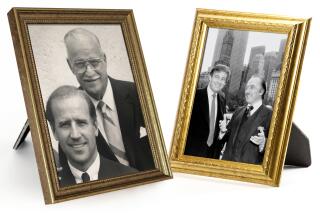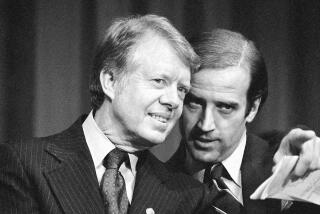Bush’s Earlier View to a Presidency Serving Him Well
- Share via
WASHINGTON — George W. Bush, among the five children of the 41st president, most publicly felt the sting of his father’s 1992 defeat. Now he is showing he learned the lessons of his father’s presidency, particularly its failures.
Unlike his father, long viewed by conservatives as a closet moderate, he is letting no one get to the political right of his White House.
He is letting no one in his White House engage in freelance policy and politics; he has demanded, and so far he has won, complete loyalty from his senior staff. He is hewing to most of his campaign promises--so far. He remains focused on his message. He has demonstrated he has taken his father’s no-new-taxes lesson to heart: He is showing no retreat from his campaign promise to cut taxes.
And the No. 1 lesson, learned from the bitter experience of 1992: He knows the importance of accumulating political capital--and then spending it quickly, before it dissipates.
His father worked long hours and played hard. This Bush seems moderate in every way--except, unlike his father, in his politics. And, unlike his father, he has not tried to separate the quasi-campaign aspects of the presidency from the governing.
“He learned firsthand, and there’s nothing like it,” said Mark McKinnon, one of Bush’s senior campaign aides in Austin, Texas. “He doesn’t talk about the lessons. A lot of it is in the DNA. He watched his father very closely and saw what worked and what hurt. Obviously, he learned from the mistakes.”
Those who have watched Bush closely over the last two decades--some friends, some aides, some who are both, some who spoke on the record and others, mindful of Bush’s disdain for those who speak out of class, asking not to be identified--say that some of the characteristics of his emerging presidency would be at the fore regardless of his father’s experience in the Oval Office.
But more than that, he has demonstrated during the opening scenes of his White House that he has brought to the Oval Office the perspective that can only be attained through very close observation of the presidency.
“This president has a view of the presidency that is generally available only to past presidents,” said Rep. Roy Blunt (R-Mo.), perhaps one of Bush’s closest friends in Congress.
Paying attention to the back-room business of the West Wing when his father was president, Bush had an inside look at potential problems: A chief of staff, John H. Sununu, who critics said failed to keep the staff sufficiently focused on the president’s goals; senior staff members who developed their own agendas; and a conservative backlash, epitomized by Pat Buchanan’s campaign for the Republican presidential nomination, challenging the incumbent president in 1992.
As it became evident that Sununu was not working out as chief of staff, said a longtime Bush loyalist who has worked for father and son, “George W. was privately trolling the old Bushies, to get their opinions.”
And, she said, he played a similar role monitoring the performance of Bush’s vice presidential chief of staff a few years earlier.
“I’m sure he learned from both those situations . . . to not have a strong chief of staff who may think he’s running the White House,” the aide said.
Indeed, that lesson played out as soon as Bush reached the governor’s office in Texas six years ago.
“He was determined. He wasn’t going to have a chief of staff making decisions for him,” said the former aide, who spoke only on condition of anonymity. “He is very aware of the problems it caused his dad.”
He also saw how fickle the voting public can be: Under the burden of economic recession, his father’s approval rating fell from a phenomenal high of 89% at the end of the Persian Gulf War in February 1991 to 29% just 17 months later. Reelection defeat followed.
Get a Clear Sense of Vision
From all that comes a lesson that goes beyond electoral politics to a style of governing in which a leader begins with a dedication to public service, makes clear a sense of vision and takes quick advantage of popular support to press forward with a policy agenda.
Examining the lessons he brought from his father’s presidency, Bush said in an interview in 1998:
“There is a difference, in a way. The concept of service is a very strong concept that was passed on from my dad’s father to him; you served. I feel that as well. But on the other hand, I think you’ve got to have a reason to go into the political process. You’ve got to have a vision.
“I did learn a lesson about incumbency,” he said of his father’s 1992 reelection defeat. “You can’t [just] defend your record. There has to be a ‘what next.’ ”
Bush looked back, about the same time, to another lesson of his father’s presidency, in a conversation with Gov. William Janklow of South Dakota.
“You know, Janklow, one thing all of us have to understand: There are two kinds of people in Washington--the people who bounce from administration to administration, willing to be anything for anybody, and then there are loyalists, and it’s important they become part of the army,” the governor recalled Bush telling him.
When his father was president, George W. Bush had no formal role in the administration. Rather, he would show up at the White House on occasion, drop in on West Wing staffers and engage in what amounted to schmoozing-with-a-purpose.
“He was efficient with his time,” said Andrew H. Card Jr., the current White House chief of staff, who was a deputy staff chief and then Transportation secretary in the first Bush administration.
“He never meddled,” Card said. Instead, the mission was one of “intelligence-gathering.” And Bush played a similar role in his father’s 1988 and 1992 presidential campaigns, making unannounced visits to the headquarters staff and reporting back to his father.
“He was an inside-outside observer,” Janklow said. “He got to see what was going on. . . . He understands as an elected political officeholder you have a base core of support and you have to deal with your base in a political way.”
Read that: If your base cares passionately about not raising taxes, and you promise not to raise taxes, don’t raise them.
“His father never recovered from that,” Janklow said, referring to former President Bush’s decision to raise taxes after running in 1988 on the slogan, “Read my lips: No new taxes.”
Janklow added: “President Bush--George W.--I think he fully understands when you draw lines in the sand you can’t go across them.”
Concentrating His Clout
But, said a senior aide who has worked closely with Bush for more than six years, “The first thing he’d tell you is, he will earn and spend [political] capital. His father erred in not spending the capital he accumulated during the Gulf War. He didn’t seize the moment in setting up the ’92 election.”
And just as he did as governor, he is spending that capital on just a few issues--education, taxes and the budget are at the top of the list--rather than scattering his attention, and thus lessening his clout, across the policy landscape in the way his father skipped from issue to issue.
To be sure, there also are differences between the 41st and 43rd presidents that may be attributed more to their different characters, experiences and ages than to lessons the son learned from the father.
“His dad . . . was much more inclined to be an ‘in-box’ president, [dispatching] whatever came through his desk,” Missouri Rep. Blunt said. “This president is much more inclined to be an ‘out-box’ president. He’s focused on doing things that change the country. In the campaign, he realized the importance of what his dad referred to as ‘the vision thing.’ . . . He’s more willing than his dad to be open about his own sense of personal values.”
More to Read
Get the L.A. Times Politics newsletter
Deeply reported insights into legislation, politics and policy from Sacramento, Washington and beyond. In your inbox twice per week.
You may occasionally receive promotional content from the Los Angeles Times.









